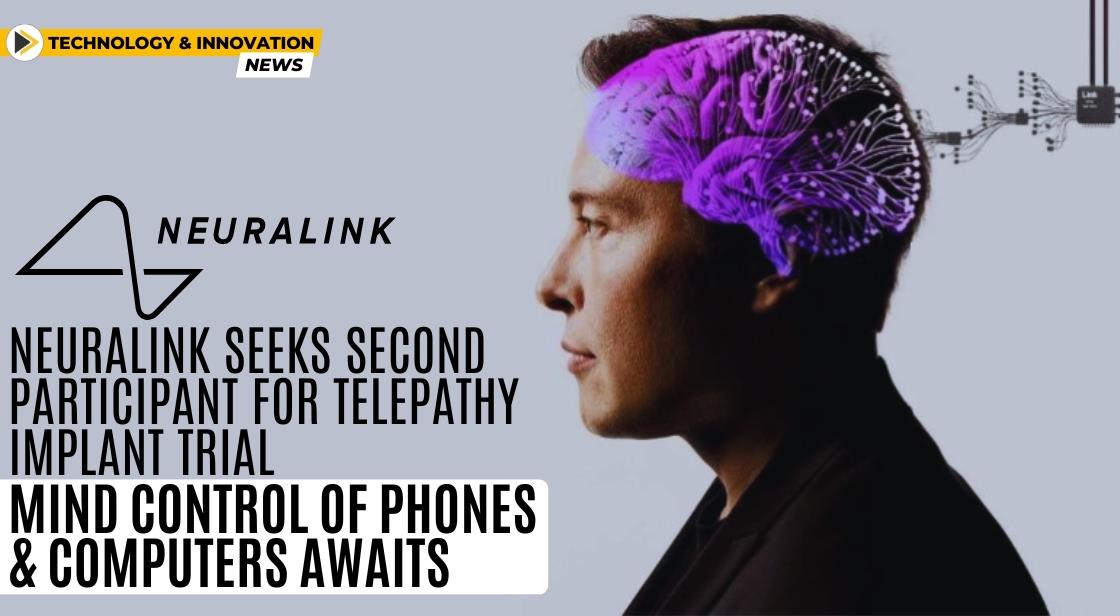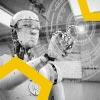Neuralink Seeks Second Participant for Telepathy Implant Trial: Mind Control of Phones and Computers Awaits

News Synopsis
Elon Musk's Neuralink is searching for a new participant to test its groundbreaking Telepathy brain implant. This implant offers the potential to control phones and computers solely through the power of thought.
Calling All Qualified Candidates: Neuralink Opens Applications
The opportunity is open to individuals with disabilities residing in the United States and Canada. Interested individuals can apply through the "Patient Registry" section on the Neuralink website, selecting the "Application" option. It's important to note that selection is competitive, and successful candidates may be considered for participation in either ongoing or future clinical trials.
Following Noland Arbaugh's Pioneering Journey
This new participant will join Noland Arbaugh, who etched his name in history as the first person to receive Neuralink's brain-computer interface chip. The 29-year-old Texan, paralyzed after a diving accident, experienced remarkable progress using the implant. He was able to control a computer cursor with his mind and even play games like Civilization VI and Mario Kart.
Initial Success Followed by Challenges:
Arbaugh's initial journey was promising. He excelled in standardized assessments designed to evaluate brain-computer interface functionality. However, unforeseen challenges arose. Neuralink revealed that some of the implant's threads, lodged in Arbaugh's motor cortex, began to retract over time. This was attributed to residual air pockets left behind during surgery.
Emotional Toll of Setbacks:
In a candid interview, Arbaugh recounted the emotional toll of losing his newfound abilities. "I started losing control of the cursor," he shared, expressing his disappointment. He discovered the retracting threads were the culprit, bringing his initial progress to a halt.
Neuralink Responds and Arbaugh Remains Engaged:
Despite this setback, Neuralink actively addressed the declining data stream from Arbaugh's implant. A recent company blog post highlighted successful adjustments to the implant's signal-interpreting algorithm, resulting in improved data transmission. Arbaugh's perseverance is also noteworthy. He has resumed using the implant to trace letters on his computer screen, aiding Neuralink in developing software that can recognize words and, ultimately, complete sentences through thought control.
The Road Ahead for Neuralink
Neuralink is actively seeking a new participant to build upon the knowledge gained from Arbaugh's experience. The company's ongoing efforts to refine the technology hold immense promise for individuals with disabilities and could revolutionize the way we interact with our digital world.
Looking Ahead: The Future of Neuralink
Expanding Participation
Neuralink's search for a new participant marks a crucial step in the evolution of brain-computer interface technology. As the company continues to refine its algorithms and enhance data throughput, it aims to enable more users to control devices with their minds.
Elon Musk's Vision
Elon Musk's vision for Neuralink extends beyond individual applications, aiming to integrate brain-computer interface technology into broader societal contexts. The success of current and future participants will be instrumental in realizing this ambitious vision.
Conclusion
Neuralink's search for a new user to trial its Telepathy cybernetic brain implant represents a significant advancement in brain-computer interface technology. With successful adjustments to its algorithms and a continued commitment to user security, Neuralink is poised to make groundbreaking strides in mind-controlled technology.
You May Like









